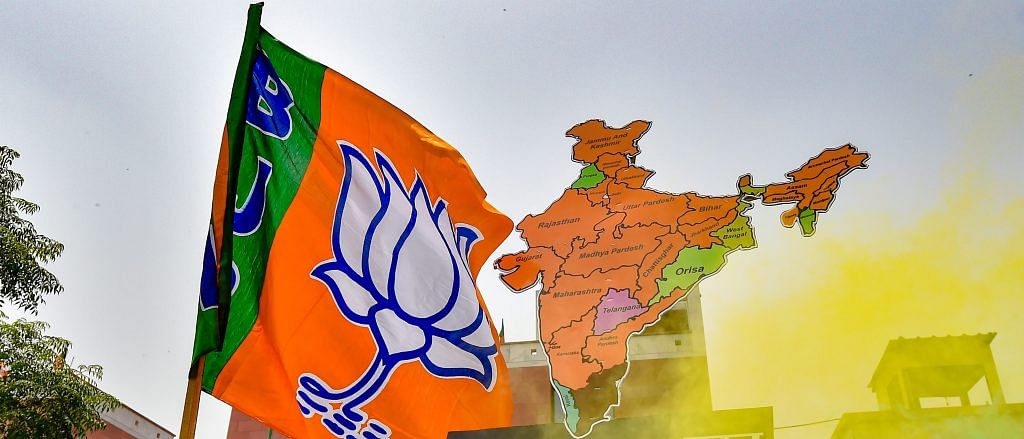The Congress is going through its worst electoral phase. But the problem is not poor representation in Parliament – after all, the Bharatiya Janata Party had only two members in 1984 Lok Sabha.
The Congress’ biggest worry is that it does not have an ideological base, which also translates into not having a vote-bank. On most policy matters, the Congress doesn’t seem too different from the BJP, which explains why the 135-year-old behemoth has slipped into irrelevance: a political system can’t have two parties of the same kind in the ruling position.
A closer look reveals that except a flimsy difference in their ‘pseudo-secularism’, there is not much that separates the Congress from the BJP. Both have the same social base, same economic outlook; both parties lack internal democracy. Perhaps, the only difference is that while the BJP has firmly established its hardcore Hindutva policy for all to see, the Congress’s top leadership has to repeatedly remind people that its leader is a Brahmin.
Given the similarities, why is it that the BJP is in power and the Congress isn’t? That’s because the Congress lost its core support base, while the BJP consolidated its vote-bank.
Also read: A ‘Congress Singh’ takes charge of BJP’s UP unit as party hopes to win OBC votes
Gradual decline of Congress
The Congress, since its formation, has been a party of the elites. Before Mahatma Gandhi’s entry into politics, it was a party of land owners (zamindars) who demanded ‘home rule’ under the British Raj. After Independence, when the country adopted a democratic system of governance, the Congress finally connected with the Dalits, minorities, and the tribals and ruled for subsequent decades.
But things started changing in the 1960s. After India’s humiliating defeat in the 1962 war, there was a growing disenchantment with Jawaharlal Nehru.
Over the next few decades, the increasing prosperity of the elites, the deteriorating condition of the poor and the rise in corruption and inflation made people turn away from the Congress. Various developments like Bihar’s JP movement, Gujarat’s Navnirman Andolan led by students, and the Emergency imposed by Indira Gandhi broke the Congress’ charm.
By the 1980s, the aggressive entry of parties like the BSP and the Janata Dal made the feudalistic,Manuwadi Indian society uncomfortable. The BJP took advantage of this social churning. Its Rath Yatra in 1990 from Gujarat to Uttar Pradesh, coming right after the V.P. Singh government tabled the Mandal Commission’s report, which gave reservation to the socially backward, heralded the BJP’s entry into India’s political scene as a major player.
Also read: When Chandra Shekhar’s Young Turks beat Congress old guard with Indira Gandhi’s support
Rise of regional powerhouses
This period also witnessed the rise of Dalit-backward politics. If it was Mulayam Singh Yadav, Kanshiram and later Mayawati in Uttar Pradesh; it was Lalu Prasad Yadav in Bihar. The Congress began to lose support in the Hindi-speaking states.
In Jharkhand, the Congress lost the support of tribals. The minorities remained with the party for a while but soon began to support political groups in their regions that seemed more likely to defeat the BJP.
Upper castes by then had anyway started gravitating towards the BJP when they sensed that the Congress would not be able to respond to the aggressive politics of the parties representing Dalits and the backward groups.
Way out for Congress
But the bigger problem for the Congress today is not that it can’t win elections. The party is facing an existential crisis because it can’t take a high moral ground on issues that can help it launch mass movements and win supporters.
When the Congress launches a movement against corruption, it forgets that students’ agitation in Bihar was against the corrupt Congress government. When the Congress talks about Narendra Modi government’s dictatorship, people are reminded of Emergency. When it mentions democracy, they look at the absence of democracy within the Congress. If it says that the BJP is being managed by the RSS, then the same holds true for the Congress as well, which is managed by one family.
Also read: Congress today doesn’t need a leader or an election win, it needs an ideology
In its existing form, the Congress doesn’t offer people any hope, because it doesn’t provide an alternative to the politics of the BJP.
If the Congress wants to revive itself, this is how it can do it – offer an alternative economic policy; practice real secularism instead of pseudo-secularism; stay true to Constitutional beliefs of equality and freedom; and run the party democratically.
The author has been associated with the JP movement, and has penned a novel ‘Samar Shesh’. Views are personal.
This article has been translated from Hindi. Read the original here.
